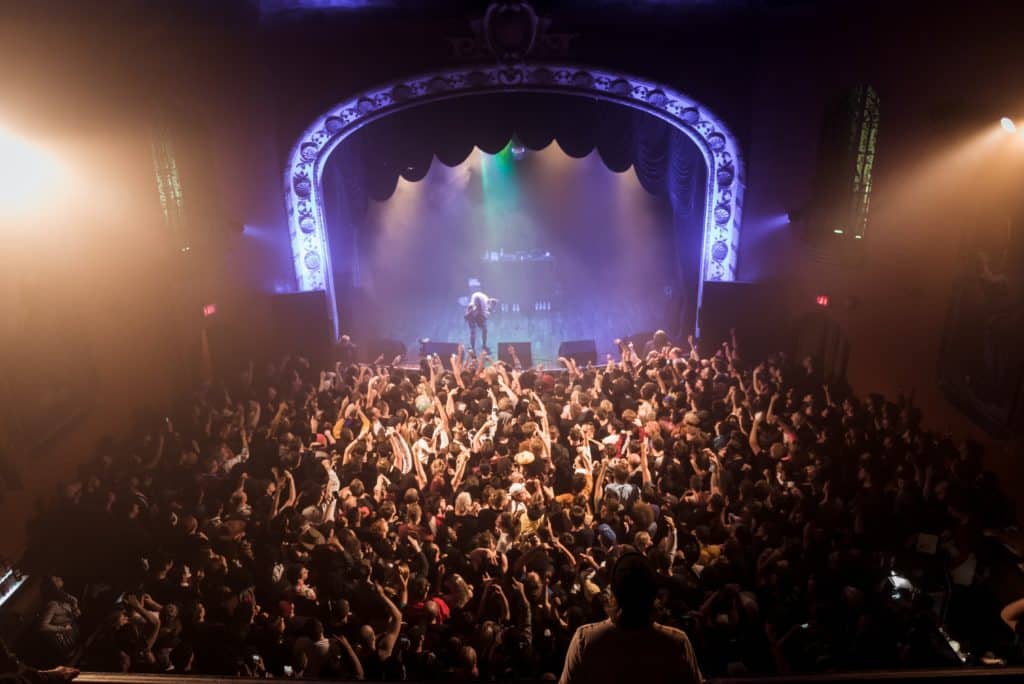
Concert Venue Settlement Best Practices
The band just wrapped, the crowd is still in a frenzy, and now it’s time for the final touches of an epic concert. That means smoothing out the concert venue settlement process to the point it’s hardly noticeable. For a music pro who just put everything into the show, getting paid correctly and on time is the path to reliability and trust.
A seamless settlement is also the key to future business. Having a streamlined and professional process shows that you value everyone involved, from the artists to the stagehands. And when everyone walks away feeling valued, a concert promoter or agent is already setting high expectations for the next project. By swiftly handling the back end, you send a clear message you know how to turn the buzz of a concert into success for everyone involved.
Whether you’re a seasoned pro or just starting out, everyone’s management process can benefit from improvement. Consider these tips to ensure your operation is as fast, accurate, and as transparent as possible.
Concert venue settlement: tips to get you started
Settlement may not be the glamorous part of live music, but it’s also the essential ingredient that keeps everyone on the same page. Overseeing a sloppy or drawn-out process is an easy way to demonstrate that you’re not ready for the big time. A successful settlement also starts long before the show begins to take shape. Nail down the details in the early steps and you’ll be on much firmer ground as you move toward the final stages.
Understand the artist deal memo inside and out
Before you enter a settlement meeting, scrutinize the event’s deal structure and look for potential issues. The time to resolve a problem is often at the very beginning—a common mistake is to go into an initial settlement meeting unprepared to ward off problematic deal elements. To handle this effectively, you need to master a few of the basics when it comes to artist fees, including:
- Flat guarantee—the contract states the predetermined amount for the artist’s fee. It’s helpful to know if this is a typical arrangement for the artist and, if possible, what they have been paid in the past.
- Versus deal—the artist gets either a guaranteed amount or a percentage of the net income, whichever is greater. A common artist’s fee is about 85%, with 10% typically going to the booking agent.
- Guarantee plus percentage deal—in some cases, an artist gets a percentage bonus, which is usually based on tickets sold. Artists might also seek performance bonuses if they surpass the parameters of the contract (e.g., playing an extra set). Clarity and transparency are even more important if you want to have a smooth settlement with a guarantee plus percentage deal.
Consider requesting an updated deposit report
Once you know what kind of deal you’re working with, ask to see an updated deposit report. The deposit report will identify how much money the artist has already been paid for the event. Knowing how much the artist has already received will help you nail down the rest of the deal and determine everyone’s payments. Having the report on hand also provides an excellent reference point for later on in the settlement process.
Determine how you want to get paid (and have the proper documentation)
Being upfront about whether you want your payment in cash, check, online payment, or wire transfer can help everything go smoothly. For example, if you’re going to be paid by wire, have the wiring instructions ready to go when the time comes. You’ll also want to ensure you’ve received or delivered a W9 to your settlement contact as early as possible; taking care of the document fundamentals is one of the keys to easy settlements.
Related: The Impact Of Music Business Management Software On The Industry
This can also be a good way to demonstrate flexibility. Having two or more ways to be paid can make it easier on other parties and improve your odds of a perfect settlement. By showcasing a touch of flexibility, you can avoid snags and ensure you’re paid as soon as possible.
Iron out expenses and side deals
One way to finish a concert on a low note is to leave the artist responsible for unexpected expenses. Prominent booking agents are wary of artists who end up being charged for room expenses they simply do not need, slicing into their show profits. While artists want to be comfortable before and after a show, they also don’t want to pay for items they don’t need and didn’t ask for. To avoid miscommunication, verify as many expenses as possible beforehand.
You will also need complete transparency on merch sales and other percentage-based deals. For merchandise, it’s common for venues to take a cut of the profits but it’s essential that both parties are properly compensated. Make sure any merchandising or percentage deals are clear and fair long before the day of the concert.
A guide to preparing the settlement document
As you begin to build the settlement for the event, you’ll start by inputting basic information into a template, spreadsheet, or word processor. The goal is to create a plain, standardized document that will be immediately understood by a music professional you have never worked with before. Don’t forget to include the basics, such as:
- Artist name
- Date of event
- Location (City, State)
- Venue
- Artist Fee
- Budgeted expenses
If you don’t plan on letting an automated software platform do some of the data entry and number crunching, it can be helpful to have a neutral party look over the document before passing it along. Simple mistakes in the basic documentation suggest an unprofessional approach and can lead to problems down the road.
Prepare (or request) a preliminary settlement
Here’s where you bring everyone into the fold about the realities of the concert. If there are areas where expenses are coming in lower than expected, expressing cautious optimism can generate some positive vibes heading into the show. You can also point out any costs you want to revisit as the document progresses toward the final settlement. And if there are any expenses that are on the high side, the preliminary document is where you can address them, helping you avoid unpleasant surprises.
Handling the final settlement
It’s time to pull out the fine-toothed comb and inspect every aspect of the settlement. Your final settlement needs to include all the receipts, invoices, and correlating documents that demonstrate the expenses of the show. Without supporting documentation for every cost, you can expect a settlement delay.
The final settlement is also an opportunity to compare actual costs with the preliminary budget. Perfectly matching the actual costs to the original budget is difficult to impossible, but you will get an excellent overview of the entire project. If the costs and budget don’t align especially well, it’s a good idea to revisit the divergence at a later point. Having correct expense documents will also help you maintain total transparency if the show doesn’t go as initially budgeted.
Questions to keep in mind when reviewing the final settlement
Troubleshooting for ways a concert can go wrong will help you stay on top of the whole structure. As you review the final settlement, ask yourself:
- Are the calculations accurate?
- Why did costs go over/under the budget?
- Do the reported expenses make sense?
- Are the totals for GBOR (Gross Box Office Receipts) and the artist’s payment correct?
- Is everyone reporting the same numbers across the board?
- Were initial concerns appropriately addressed?
Having a math party isn’t exactly what music professionals fantasize about. But this is also where a well-prepared pro can really make their mark. By having all the financial elements neatly organized and accurate during a final settlement meeting, you can spend minimal time on number crunching before moving on to greener pastures. Having thoughtful answers to budget/final cost discrepancies shows your commitment to improvement moving forward.
The final settlement meeting is also where you can bring the whole process full circle. If there were initial concerns in the early stages, how well were these issues handled? If you resolved an issue a booking agent had with the original deal, it’s helpful to demonstrate how well those concerns were alleviated. In the end, the settlement allows mutuals to review all business elements of the show, clear the air (if necessary), and finish the event with a stroke of professionalism.
Automating the concert venue settlement process
The number of moving pieces involved in a live concert event can be dizzying for the planners. Invoices can be misplaced or numbers miscalculated. One mistake in data entry early on can create a disastrous butterfly effect. No matter how well you know the industry, every settlement document you prepare has your reputation embedded in the subtext.
Related: What Is Web3 And How Is It Revolutionizing The Live Music Industry?
This is why so many promoters and agents are turning to automated software to alleviate the pressure. Centralized platforms let everyone access critical information from anywhere at any time, allowing teams to move in synchronicity. Instead of manually crunching numbers, or relying on generic spreadsheets, music-first software can help you keep track of everything you will need in settlement.
It can also help you by automating the payment process. Even the most organized organizer or promoter can lose track of a payment, an issue that can be resolved with automated payments that always get sent out exactly when they’re supposed to. Sending agreed-upon funds on time is one of the very best ways to show partners that you’re on top of the business when it comes to concert venue settlement.
Efficiency and ticket tracking
While organization is one of the main advantages of automation and cloud-based solutions, the efficiency uptick is just as important. Streamlining the numbers game helps professionals juggle multiple events while ensuring the most accurate figures possible. Moving from offers and estimates to actuals can end up taking a fraction of the time that it used to, allowing you to focus on other critical aspects of the business.
With real-time ticket tracking, promoters have the ability to measure expectations versus reality on the fly. This allows you and your partners to make any adjustments that will impact the bottom line. In a world where data is so rapidly calculated and disseminated, not having at least some automation in your process can even be a red flag to would-be collaborators.
When promoters and agents work with reliable, automation-based platforms, the entire concert venue settlement process becomes much more manageable.
Using a platform built for the music insider
You need a specialized toolkit to be a music professional in today’s industry, especially if you’re involved in the settlement process. Having an all-encompassing platform designed for the challenges of live music can make a tremendous difference. With the right package of tools, you can stay on top of all documentation and financial information on your way to a seamless settlement.
When you’re ready to upgrade your process, Prism can help you keep track of everything in one easy-to-use platform. From budgeting to settlement and deal tracking and more, our diverse slate of music-specific tools can smooth out all areas of the business and keep you on top of industry trends. Get started with Prism today to see how much automation can change the way you wrap up your events.

Matt Ford is the founder and CEO of Prism.fm, an Austin-based software company revolutionizing live music event management. With a background in entrepreneurship and a degree from the University of Wisconsin-Madison School of Business, Ford combined his self-taught coding skills with firsthand experience as a concert promoter to address the inefficiencies he observed in the industry. In 2018, he launched Prism.fm, an all-in-one platform designed to streamline operations for venues, promoters, and agencies by replacing cumbersome spreadsheets with integrated tools for booking, financial tracking, and contract management. Under his leadership, Prism.fm has grown significantly, achieving $3 million in annual recurring revenue post-COVID and securing over $15 million in funding . Ford’s commitment to building user-centric solutions has positioned Prism.fm as a trusted partner for over 1,500 venues and promoters worldwide.



